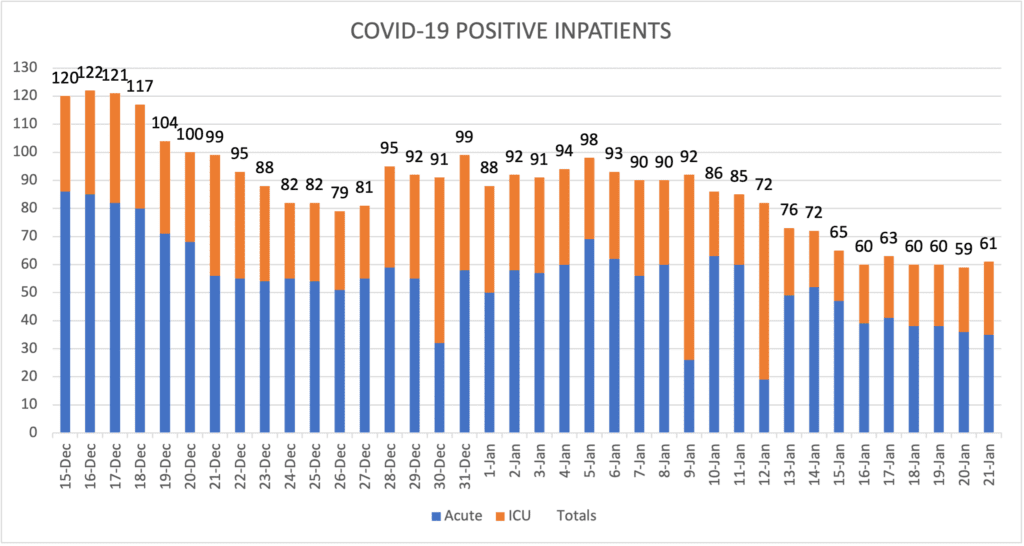Data Snapshot
UW Medicine Hospitals:

King County: The county reported 324 new positive cases and 13 new deaths on Jan. 17. (Please note that on Jan. 17 the WA State Department of Health resolved a duplication issue that removed 950 duplicate records for positive cases from their data system, this correction resulted in decreased counts of positives, hospitalizations and deaths.)
Washington: The state reported 281,258 cases and 3,940 deaths as of Jan. 19.
United States: The CDC reports 24,135,690 cases and 400,306 deaths as of Jan. 20.
Global: WHO reports 95,321,880 confirmed COVID-19 cases and 2,058,227 deaths as of Jan. 21.
Numbers update frequently, please follow links for most up-to-date numbers.
UW Medicine COVID-19 Vaccine Distribution Update
- Total first dose: 29,541
- Total second dose: 6,613
As of Jan. 20, 2021.
COVID-19 Literature Report
COVID-19 Literature Situation Report is a daily (M-F) newsletter put together by the Alliance for Pandemic Preparedness that provides a succinct summary of the latest scientific literature related to the COVID-19 pandemic.
Key Takeaways: COVID-19 Literature Situation Report Jan. 19, 2021
- The sensitivity of the BinaxNOW antigen test to detect people infected with SARS-CoV-2, compared with RT-PCR, was 35.8% among asymptomatic persons and 64.2% among and symptomatic persons. Specificity was near 100% in both groups. Sensitivity was higher among specimens positive for viral culture. More.
- A large retrospective study of COVID-19 contact tracing in Wuhan, China (through April 18, 2020) estimated an overall attack rate within households of 15%. Older individuals were the most susceptible to infection, but were the least likely to transmit to others if infected. Asymptomatic individuals were 80% less likely to infect others compared to symptomatic cases. Pre-symptomatic individuals were 1.4-times as likely to infect others compared to after symptom onset. More.
- While antibody titers and neutralizing activity decline over time following SARS-CoV-2 infection, levels of SARS-CoV-2 specific memory B cells remain unchanged up to 6 months. Over time, memory B cells produce antibodies with increased potency and resistance to viral mutations. More.
- The authors of an analysis of nationwide weekly SARS-CoV-2 incidence in Israel conclude that easing social gathering restrictions, rather than school reopening, was the major contributor to transmission. More.
COVID-19 Literature Surveillance Team, is an affiliated group of medical students, PhDs and physicians keeping up with the latest research on SARS-CoV-2 / COVID-19 by finding the newest articles, reading them, grading their level of evidence and bringing you the bottom line.
Read the latest report: Jan. 20 | Daily COVID-19 LST Report.
Listen to the latest podcast: Jan. 11 | COVID-19 LST Podcast.
UW Medicine in the News
NPR: 3 Questions And The Emerging Answers About COVID-19 Vaccine Protection
Featuring: Marion Pepper, Immunology
“As the COVID-19 vaccine rolls out, three big questions loom. First, can someone who has been vaccinated still spread the disease? Second, will the vaccine remain effective as the virus itself evolves? And third, how long will the vaccine’s protection last? Answers to these questions lie in our immune systems. And the answers aren’t straightforward because our immune systems are both remarkably adept and remarkably challenging to predict. Let’s start with the first question, about whether people who are vaccinated can still spread the disease. Marion Pepper, an immunologist at the University of Washington, says that’s not just an open question for this vaccine, but for vaccines in general. ‘I think it’s hard to say because we’re constantly being bombarded by different pathogens and we don’t know when your immune system is responding,’ she says. We may have infections that don’t make us sick, so we never know about them. But we could be spreading disease. When a person is infected – or inoculated with a vaccine – the immune system gears up to produce antibodies that specifically target the virus. Over time, those antibodies naturally wane. But the immune system still holds a memory of the virus, and if it ever shows up again, cells spring into action and start to gear up a new batch of antibodies. However, that process can take three to five days.”
The Seattle Times: A worrying coronavirus mutation is discovered in Washington state — but hasn’t spread
Featuring: Pavitra Roychoudhury and Alex Greninger, Laboratory Medicine; Trevor Bedford, Genome Sciences
“Three COVID-19 infections diagnosed in Washington in October were caused by virus with a mutation that might boost the respiratory bug’s ability to dodge immune defenses. The mutation, called E484K, is also present in two of the worrisome new viral variants spreading around the globe — those that originated in South Africa and Brazil. But the virus detected in Washington did not have any of the other mutations that characterize those variants, said researchers at the UW Medicine Virology Lab. No other infections with the mutation have been detected since October, though surveillance is limited in the state. ‘Based on what we have right now, it hasn’t taken off,” said computational biologist Pavitra Roychoudhury, part of a team that sequenced the three genomes. “We definitely want to keep an eye on it.’ The mutation has been spotted sporadically in the U.S. since spring, said Trevor Bedford, a computational biologist at the Fred Hutchinson Cancer Research Center who has been tracking genetic changes in the virus since the start of the pandemic. Those isolated sightings haven’t sparked major outbreaks. ‘It appears that just having the (E484K) mutation isn’t enough to make a huge difference to the virus,’ he wrote in an email. However, in combination with the 10 or more other mutations in the South Africa and Brazil variants, it is spreading rapidly.”
KUOW: Ethics of COVID-19 vaccine rollout
Audio featuring: Patricia Kuszler, Bioethics and Humanities
“Since the start of the pandemic, thorny ethical questions have popped up. Should we force people to wear masks? Who should be first to get the vaccine and can we mandate getting vaccinated? University of Washington law professor and physician Dr. Patricia Kuszler answers your questions about ethical concerns of rolling out the vaccine.”
Tweet of the Week
The screening tool's applicability to the general population is unknown, so it "should be used with great caution," said Dr. Aria Jafari about the finding. https://t.co/ButDFMEl0h @oto_uw
— UW Medicine Newsroom (@uwmnewsroom) January 20, 2021

